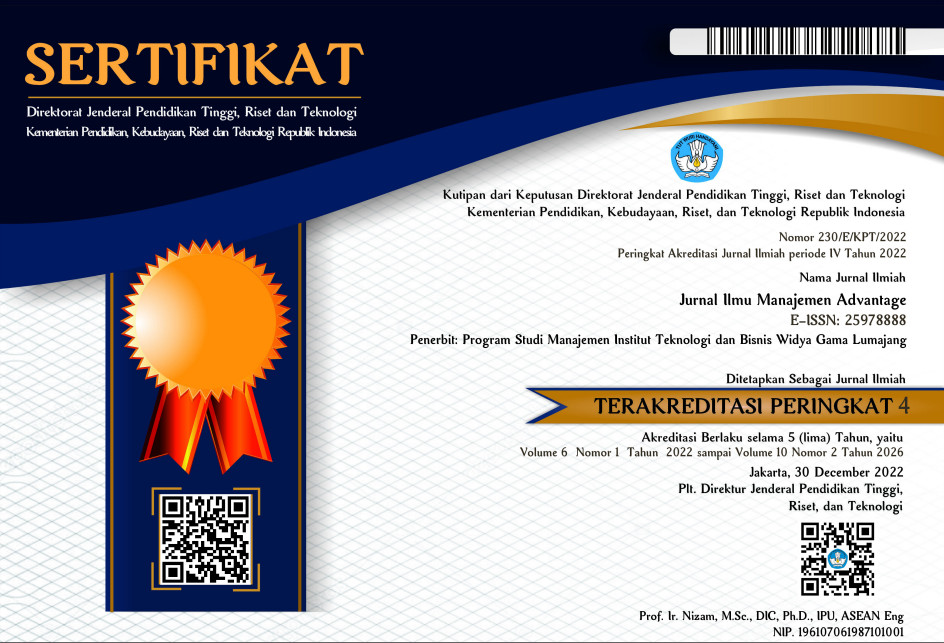Green Human Resource Management on Green Behavior Mediated by Green Work Engagement Among Rejang Lebong Hospital
DOI:
https://doi.org/10.30741/adv.v7i2.1187Keywords:
Employee Green Behaviour, Green Human Resource Management, Green Work EngagementAbstract
Human resource management refers to the strategies and practises implemented by an organisation to effectively oversee and nurture its personnel, enabling them to effectively accomplish the organization's objectives and mission. The aim of this research is to investigate the relationship between Green Human Resource Management and Green Behavior, which is then explored with the role of Green Work Engagement as a mediator. This research uses an explanatory method. The data collection method was carried out through distributing questionnaires involving all 300 Rejang Lebong Regional Hospital employees. In addition, this research uses a non-probability sampling method, namely the number of samples is adjusted to the population size. The testing steps start from testing validity, reliability, direct influence hypothesis, mediation effect hypothesis, and finally cross-loading. The study's findings indicate that (1) Rejang Lebong Hospital's employee green behavior has improved significantly since implementing green human resource management (2) Green work engagement has a positive and significant impact on employee green behavior at Rejang Lebong Hospital (3) Rejang Lebong Hospital's green work engagement is significantly influenced for the better by the hospital's green human resource management (4) Green human resource management has a big and positive impact on employee green behavior at Rejang Lebong Hospital. This influence is mediated by the green work engagement have towards environmentally conscious work practises.
Downloads
References
Aboramadan, M., Dahleez, K., & Hamad, M. H. (2020). Servant Leadership and Academics Outcomes in Higher Education: The Role of Job Satisfaction. International Journal of Organizational Analysis, 29(3), 562–584.
Anwar, N., Mahmood, N. H. N., Yusliza, M. Y., Ramayah, T., Faezah, J. N., & Khalid, W. (2020). Green Human Resource Management for Organisational Citizenship Behaviour Towards the Environment and Environmental Performance on A University Campus. Journal of Cleaner Production, 256, 1–13.
Arulrajah, A. A., Opatha, H. H. D. N. P., & Nawaratne, N. N. J. (2015). Green Human Resource Management Practices: A Review. Sri Lankan Journal of Human Resource Management, 5(1), 1–16.
Benayas, J., Alba, D., & Sanchez, S. (2002). The University and Sustainable Development: The Environmentalisation of University Campuses: The Case of the Autonoma de Madrid University. Aeet. https://www.aeet.org/ecosistemas/023/educativa2.htm
Borman, W. C., & Motowidlo, S. J. (1997). Task Performance and Contextual Performance: The Meaning for Personnel Selection Research. Human Performance, 10(2), 99–109.
Borman, W. C., & Motowidlo, S. M. (1993). Expanding the Criterion Domain to Include Elements of Contextual Performance. Personnel Selection in Organizations, 71, 78–98.
Bowen, D. E., & Ostroff, C. (2004). Understanding HRM-fi RM Performance Linkages: The Role of the “Strength” of the HRM System. Academy of Management Review, 29(2), 203–221.
Brio, J. A. de, Junquera, B., & Ordiz, M. (2008). Human Resources in Advanced Environmental Approaches – A Case Analysis. International Journal of Production Research, 46(21), 6029–6053.
Chaudhary, R. (2019). Green Human Resource Management in Indian Automobile Industry. Journal of Global Responsibility, 10(2), 161–175.
Chou, C.-J. (2014). Hotels’ Environmental Policies And Employee Personal Environmental Beliefs: Interactions and Outcomes. Tourism Management, 40, 436–446.
Dajani, D. M. A. Z. (2015). The Impact of Employee Engagement on Job Performance and Organisational Commitment in the Egyptian Banking Sector. Journal of Business and Management Sciences, 3(5), 138–147.
Disterheft, A., Caeiro, S. S. F. da S., Ramos, M. R., & Azeiteiro, U. M. de M. (2012). Environmental Management Systems (EMS) Implementation Processes and Practices in European Higher Education Institutions-Top-Down Versus Participatory Approaches. Journal of Cleaner Production, 31, 80–90.
Dubois, C. L. Z., & Dubois, D. A. (2012). Strategic HRM as Social Design for Environmental Sustainability in Organization. Human Resource Management, 51(6), 799–826.
Dumont, J., Shen, J., & Deng, X. (2017). Effects of Green HRM Practices on Employee Workplace Green Behavior: The Role of Psychological Green Climate and Employee Green Values. Human Resource Management, 56(4), 613–627.
Finlay, J., & Massey, J. (2012). Eco-Campus: Applying the Ecocity Model to Develop Green University and College Campuses. International Journal of Sustainability in Higher Education, 13(2), 150–165.
Gilal, F. G., Ashraf, Z., Gilal, N. G., Gilal, R. G., & Chaana, N. A. (2019). Promoting Environmental Performance Through Green Human Resource Management Practices in Higher Education Institutions: A Moderated Mediation Model. Corporate Social Responsibility and Environmental Management, 6, 1579–1590.
Goswami, T. G., & Ranjan, S. K. (2015). Approach to Sustainability in Current Scenario. Journal for Studies in Management and Planning, 1(4), 250–259.
Guerci, M., Longoni, A., & Luzzini, D. (2016). Translating Stakeholder Pressures Into Environmental Performance–The Mediating Role of Green HRM Practices. The International Journal of Human Resource Management, 27(2), 262–289.
Haddock-Millar, J., Sanyal, C., & Muller-Camen, M. (2016). Green Human Resource Management: A Comparative Qualitative Case Study of A United States Multinational Corporation. The International Journal of Human Resource Management, 27(2), 192–211.
Hair, J. F., Risher, J. J., Sarstedt, M., & Ringle, C. M. (2019). When to Use and How to Report the Results of PLS-SEM. European Business Review, 31(1), 2–24.
Hameed, Z., Khan, I. U., Islam, T., Sheikh, Z., & Naeem, R. M. (2020). Do Green HRM Practices Influence Employees’ Environmental Performance? International Journal of Manpower, 41(7), 1061–1079.
Jabbour, C. J. C. (2013). Environmental Training in Organisations: From A Literature Review to A Framework for Future Research. Resources, Conservation and Recycling, 74, 144–155.
Jabbour, C. J. C., Santos, F. C. A., & Nagano, M. S. (2008). Environmental Management System and Human Resource Practices: Is There A Link Between Them in Four Brazilian Companies? Journal of Cleaner Production, 16(17), 1922–1925.
Kaya, N., Koc, E., & Topcu, D. (2010). An Exploratory Analysis of the Influence of Human Resource Management Activities and Organizational Climate on Job Satisfaction in Turkish Banks. International Journal of Human Resource Management, 21(11), 2031–2051.
Kim, Y. J., Kim, W. G., Choi, H.-M., & Phetvaroon, K. (2019). The Effect of Green Human Resource Management on Hotel Employees’ Eco-Friendly Behavior and Environmental Performance. International Journal of Hospitality Management, 76, 83–93.
Kramar, R. (2014). Beyond Strategic Human Resource Management: Is Sustainable Human Resource Management the Next Approach? The International Journal of Human Resource Management, 25(8), 1069–1089.
Kuenzi, M., & Schminke, M. (2009). Assembling Fragments Into A Lens: A Review, Critique, and Proposed Research Agenda for the Organizational Work Climate Literature. Journal of Management, 35(3), 634–717.
Leon-Fernandez, Y., & Dominguez-Vilches, E. (2015). Environmental Management and Sustainability in Higher Education: The Case of Spanish Universities. International Journal of Sustainability in Higher Education, 16(4), 440–455.
Luu, T. T. (2017). CSR and Organizational Citizenship Behavior for the Environment in Hotel Industry: The Moderating Roles of Corporate Entrepreneurship and Employee Attachment Style. International Journal of Contemporary Hospitality Management, 29(11), 2867–2900.
Luu, T. T. (2019). Building Employees’ Organizational Citizenship Behavior for the Environment. International Journal of Contemporary Hospitality Management, 31(1), 406–426.
Manika, D., Wells, V. K., Gregory-Smith, D., & Gentry, M. (2013). The Impact of Individual Attitudinal and Organizational Variables on Workplace Environmentally Friendly Behaviors. Journal of Business Ethics, 126, 663–684.
Mazzi, C., Bagattini, C., & Savazzi, S. (2016). Blind-Sight vs Degraded-Sight: Different Measures Tell a Different Story. Frontiers in Psychology, 7, 901–912.
Nejati, M., Rabiei, S., & Jabbour, C. J. C. (2017). Envisioning the Invisible: Understanding the Synergy Between Green Human Resource Management and Green Supply Chain Management in Manufacturing Firms in Iran in Light of the Moderating Effect of Employees’ Resistance to Change. Journal of Cleaner Production, 168, 163–172.
Norton, T. A., Hannes Zacher, & Ashkanasy, N. M. (2014). Organizational Sustainability Policies and Employee Green Behavior: The Mediating Role of Work Climate Perceptions. Journal of Environmental Psychology, 38, 49–54.
Norton, T. A., Parker, S. L., Zacher, H., & Ashkanasy, N. M. (2015). Employee Green Behavior: A Theoretical Framework, Multilevel Review, and Future Research Agenda. Organization & Environment, 28(1), 103–125.
Ogbeibu, S., Emelifeonwu, J., Senadjki, A., Gaskin, J., & Kaivo-oja, J. (2020). Technological Turbulence and Greening of Team Creativity, Product Innovation, and Human Resource Management: Implications for Sustainability. Journal of Cleaner Production, 1(1), 1–50.
Ojo, A. O., & Raman, M. (2019). Role of Green HRM Practices in Employees’ Pro-Environmental IT Practices. Conference On Information Systems And Technologies, 678–688.
Ones, D. S., & Dilchert, S. (2012). Employee Green Behaviors. Jossey-Bass.
Opatha, H. H. D. N. P., & Arulrajah, A. A. (2014). Green Human Resource Management: Simplified General Reflections. International Business Research, 7(8).
Ortiz-de-Mandojana, N., Aguilera-Caracuel, J., & Morales-Raya, M. (2016). Corporate Governance and Environmental Sustainability: The Moderating Role of the National Institutional Context. Corporate Social Responsibility and Environmental Management, 23(3), 150–164.
Paille, P., Chen, Y., Boiral, O., & Jin, J. (2014). The Impact of Human Resource Management on Environmental Performance: An Employee-Level Study. Journal of Business Ethics, 121(3), 451–466.
Pham, N. T., Hoang, H. T., & Phan, Q. P. T. (2019). Green Human Resource Management: A Comprehensive Review and Future Research Agenda. International Journal of Manpower, 41(7), 845–878.
Ramus, C. A. (2002). Encouraging Innovative Environmental Actions: What Companies and Managers Must Do. Journal of World Business, 37(2), 151–164.
Rangarajan, N., & Rahm, D. (2011). Greening Human Resources: A Survey of City-Level Initiatives. Review of Public Personnel Administration, 31(3), 227–247.
Renwick, D. W. S., Redman, T., & Maguire, S. (2013). Green Human Resource Management: A Review and Research Agenda. International Journal of Management Reviews, 15(1), 1–14.
Rodwell, J., McWilliams, J., & Gulyas, A. (2017). The Impact of Characteristics of Nurses’ Relationships with Their Supervisor, Engagement and Trust, on Performance Behaviors and Intent to Quit. Journal of Advanced Nursing, 73(1), 190–200.
Saeed, B. Bin, Afsar, B., Hafeez, S., Khan, I., Tahir, M., & Afridi, M. A. (2019). Promoting Employee’s Proenvironmental Behavior Through Green Human Resource Management Practices. Corporate Social Responsibility and Environmental Management, 26(2), 424–438.
Saks, A. M. (2006). Antecedents and Consequences of Employee Engagement. Journal of Managerial Sychology, 21(7), 600–619.
Schaufeli, W. B., & Bakker, A. B. (2010). Defining and Measuring Work Engagement: Bringing Clarity to the Concept. Work Engagement: A Handbook of Essential Theory and Research, 12, 10–24.
Schiemann, W. A. (2011). Alignment, Capability, Engagement. PPM Manajemen.
Shuck, B., Twyford, D., Jr, T. G. R., & Shuck, A. (2014). Human Resource Development Practices and Employee Engagement: Examining the Connection with Employee Turnover Intentions. Human Resource Development Quarterly, 25(2), 239–270.
Stahl, G. K., Brewster, C. J., Collings, D. G., & Hajro, A. (2020). Enhancing the Role of Human Resource Management in Corporate Sustainability and Social Responsibility: A Multi-Stakeholder, Multidimensional Approach to HRM. Human Resource Management Review, 30(3), 1–16.
Stern, P. C. (2000). Toward A Coherent Theory of Environmentally Significant Behavior. Journal of Social Issues, 56, 407–424.
Su, L., & Swanson, S. R. (2019). Perceived Corporate Social Responsibility’s Impact on the Well-Being and Supportive Green Behaviors of Hotel Employees: The Mediating Role of the Employeecorporate Relationship. Tourism Management, 72, 437–450.
Tang, G., Chen, Y., Jiang, Y., Paille, P., & Jia, J. (2018). Green Human Resource Management Practices: Scale Development and Validity. Asia Pacific Journal of Human Resources, 56(1), 31–55.
Unsworth, K. L., Dmitrieva, A., & Adriasola, E. (2013). Changing Behaviour: Increasing the Effectiveness of Workplace Interventions in Creating Pro‐Environmental Behaviour Change. Journal of Organizational Behavior, 34(2), 211–229.
Wu, H.-C., Wei, C.-F., Tseng, L.-Y., & Cheng, C.-C. (2018). What Drives Green Brand Switching Behavior? Marketing Intelligence and Planning, 36(6), 694–708.
Yong, J. Y., Yusliza, M.-Y., Ramayah, T., Jabbour, C. J. C., Sehnem, S., & Mani, V. (2020). Pathways Towards Sustainability in Manufacturing Organizations: Empirical Evidence on Therole of Green Human Resource Management. Business Strategy and the Environment, 29(1), 212–228.
Yusoff, Y. M. (2016). For A Greener Human Resource Management. International Journal of Humanities and Management Sciences, 4(2), 190–194.
Zaid, A., & Jaaron, A. (2021). The Impact of Green Human Resource Management Practices with Sustainable and Operational Performance: A Conceptual Model. In International Conference on Business and Technology. Springer International Publishing.
Zibarras, L. D., & Coan, P. (2015). HRM Practices Used to Promote Pro-Environmental Behavior: A UK Survey. The International Journal of Human Resource Management, 26(16), 2121–2142.
Downloads
Published
How to Cite
Issue
Section
License
Copyright (c) 2023 Nessa Aulia Hani, Praningrum

This work is licensed under a Creative Commons Attribution-NonCommercial 4.0 International License.










